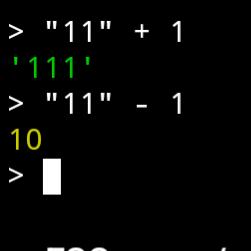- cross-posted to:
- [email protected]
- cross-posted to:
- [email protected]
This is too stupid so I had to check.

Fuck me.
Hm, playing devil’s advocate, I think it is because the minus has not been defined as a string operation (e.g. it could pop the last char), so it defaults to the mathematical operation and converts both inputs into ints.
The first is assumed to be a concat because one of the parcels is a string…
It’s just doing a lot of stuff for you that it shouldn’t be in first place 🤭
Yup. It’s completely inconsistent in its interpretation of the + operator.
Yeah, I actually had to try 1+“11” to check that it didn’t give me 12, but thankfully
it commutesit’s consistent 😇it commutes
Maybe the behaviour with regard to type conversion, but not for the operation itself.
“13”+12 and 12+“13” don’t yield the same result.
Nor would I expect “1312” to equal “1213”… Still that operator with these operands should just throw an exception
Given it’s JavaScript, which was expressly designed to carry on regardless, I could see an argument for it returning NaN, (or silently doing what Perl does, like I mention in a different comment) but then there’d have to be an entirely different way of concatenating strings.
Why would you need an entirely different way of concatenating strings? “11” + 1 -> exception. “11” + to_string(1) = “111”
expressly designed to carry on regardless
I’m surprised they didn’t borrow
On Error Resume Nextfrom Visual Basic. Which was wrongly considered to be the worst thing in Visual Basic - when the real worst thing wasOn Error Resume.On Error Resume Nextat least moved on to the next line of code when an error occurred;On Error Resumejust executed the error-generating line again … and again … and again … and again …
It’s just doing a lot of stuff for you that it shouldn’t be in first place 🤭
Kinda like log4j!
Yeah, this looks dumb on the surface, but you’ve got bigger problems if you’re trying to do math with strings
Better than doing physics with strings
From all the Javascript quiks this is the least stupid and the most obvious.
pro tip:
"ba" + 0/0 + "a"This has got to be baNaNa
That is absolutely
(n > 1) * ("ba" + 0/0 + "a")(n > 1) * (“ba” + 0/0 + “a”)
Uncaught ReferenceError: n is not defined
?

🫣
Unfortunately, it makes sense if you know what + means, which is concatenate. - is strictly a math function though.
Not saying that makes this better. It just makes sense.
It is ‘comprehensible’ in the sense that it’s possible to figure out how it happened, but it absolutely does not “make sense” in terms of being a reasonable language design decision. It’s 100% incompetence on the part of the person who created Javascript.
I mean, I’d never try to do this anyway because if the types aren’t the same unexpected things can happen. That’s like programming 101.
Exactly, which is why designing the language to allow it is incompetence.
Fair enough.
It makes perfect sense if the Lang objective is to fail as little as possible. It picks the left side object, checks if the operand is a valid operand of the type. If it is, it casts the right variable into that type and perform the operand. If it isn’t, it reverses operand positions and tries again.
The issue here is more the fact that + is used both as addition and as concatenation with different data types. Well, not an issue, just some people will complain.
Computing a nonsensical result is itself a failure. Continuing to run while avoiding giving an error in that case accomplishes nothing but to make the program harder to debug.
Thanks for saving me the typing.
I think I’m on the side of “if you do this in your code, you deserve what you get.”
Fuck me.

[object Object][object Object]
The fun strings to enter in web forms once in a while.
People that try to do mathematical operations with strings blaming the programming language that had a stated design goal to do its best and try to keep running scripts that make no sense because they realized it would be used by people that have no idea what they are doing. Clearly they were right.
the programming language that had a stated design goal to do its best and try to keep running scripts that make no sense…
…itself makes no sense. It is wrong and bad that Javascript was ever designed that way in the first place.
It was never intended to run full applications but only the small business scripts and hobbyist homepage stuff that were the thing in the 90s, across inconsistent browsers that were a jungle of hit and miss behaviour where it was preferred that menus keep working even if the mouse effect was not. Anything of scale was expected to be done in Java. Dynamic web pages did not exist and as anything not static was generated server side into a static html file to be rendered on the client.
Anyway, back then it wasn’t considered the job of the programming language to hold the hand of the aspiring developer as it is common today. It’s not a bad thing that IDE and even compilers and preprocessors try to help you write better code today, but then it simply didn’t exist.
JavaScript is from a different time and because it has the hard requirement or backwards compatibility there is no changing it and has not been for thirty years except to add stuff to it.
I think it’s just silly to ask the past to keep up with the present. Bad code is not the fault of the language regardless, even though junior devs and even seasoned ones like to think so to protect their ego. I think it is better to accept it, learn from it and roll with it because every single platform and language has their weird quirks anyway.
Signed, old dude that learned programming in 8 bit BASIC and 6502 machine code without an assembler, where code bad enough would freeze your machine that required a cold boot and starting over from your last save that you didn’t do.
Executing after undefined behavior is arguably worse than terminating with an exception. A terminated script can’t leak data or wreak havoc in other ways.
it would be used by people that have no idea what they are doing. Clearly
And so let’s enable these people?
Let’s add AI to the mix while we’re at it.Now that you mention it, it is a bit funny how Lemmy is hating LLMs as a code generation tool while also hating on the interpreter for their own hand typed code not running.
deleted by creator
I seldom use an interpreter.
Then you do not do Javascript, because it is an interpreted language.
Edit: or Python, or a command line shell, or any CORS, or databases, or… Well idk really what you do use honestly.
Then you do not do Javascript, because it is an interpreted language.
No shit?! Wow… who would’ve known…
There’s also Chefkoch and Mozart for that purpose.
deleted by creator
Personally, I think it should refuse to do the operation on operands of different types.
-
string + string = concat
-
int + int = add
-
string + int = type error
deleted by creator
-
And I think it should be able to read minds and just know what to do because magic.
deleted by creator
That’s like saying that C is bad because pointer errors or even a single pointer error is not consistent. Or that C lets you happily add a char value of a number with an integer with whatever unexpected consequences as long the code is compiling. Is C bad now?
There is a lot of valid criticism of JavaScript, as with any language, but code running with unexpected results when the code is garbage is not one of them. These common gotchas with adding numbers with strings and booleans with arrays - they should be purely academic constructions or the developer that produced them needs to take a hard look on their own abilities.
I’d have a very serious talk with any dev that tried to push code like that into main.
To start off… Using arithmetic operators on strings in combination with integers is a pure skill issue. Let’s disregard this.
If you were to use + where one part is a string, it’s natural to assume a string appending is desired since + is commonly used as a function for this. On the other hand, - is never used for any string operation. Therefore, it’s safe to assume that it relates to actual artihmetics and any strings should therefore be converted to numerical values.
This is an issue with untyped languages. If you don’t like it, use typescript. End of story.
Instead of trying to make it work, javascript could just say “error.” Being untyped doesn’t mean you can’t have error messages.
This is fair enough from an idealistic view. In practice, you don’t want your entire website to shit itself because of a potentially insignificant error.
This is exactly why it should throw an error, to make it incredibly obvious something isn’t working correctly so it can be fixed. Otherwise you have wrong logic leading to hard to notice and hard to debug problems in your code
Use typescript
No. I don’t want to transpile. I don’t want a bundle. I want a simple site that works in the browser. I want to serve it as a static site. I don’t want a build step. I don’t want node_modules. I want to code using the language targeted for the platform without any other nonsense.
Javascript is cancer. Fucking left pad?! How the fuck did we let that happen? What is this insane fucking compulsion to have libraries for two lines of code? To need configuration after configuration just to run fucking hello world with types and linting?
No, fuck Typescript. Microsoft owns enough. They own where you store your code. They own your IDE. They might own your operating system. Too much in one place. They don’t need to own the language I use, too.
“Let’s use a proprietary improvement to fix the standard that should have not sucked in the first place” is why we can’t have nice things.
No.
In practice runtime errors are a bitch to find and fix.
Fair enough. This is why people prefer typescript
I’d rather have my website shit itself than have silent difficult to find errors.
Use typescript
Look! I bought this for free on capybaras website, there’s a glitch!
capybara: at least it didn’t throw an error.
/ jk 😁
Use typescript if you’re paranoid about this
I think it’s less about type system, and more about lack of a separate compilation step.
With a compilation step, you can have error messages that developers see, but users don’t. (Hopefully, these errors enable the developers to reduce the errors that users see, and just generally improve the UX, but that’s NOT guaranteed.)
Without a compilation step, you have to assign some semantics to whatever random source string your interpreter gets. And, while you can certainly make that an error, that would rarely be helpful for the user. JS instead made the choice to, as much as possible, avoid error semantics in favor of silent coercions, conversions, and conflations in order to make every attempt to not “error-out” on the user.
It would be a very painful decade indeed to now change the semantics for some JS source text.
Purescript is a great option. Typescript is okay. You could also introduce a JS-to-JS “compilation” step that DID reject (or at least warn the developer) for source text that “should” be given an error semantic, but I don’t know an “off-the-shelf” approach for that – other than JSLint.
Imagine doing math with strings and then blaming the language not yourself
The risk is when it happens unintentionally. The language is bad for hiding such errors by being overly ‘helpful’ in assuming intent.
Sure, but at this point it’s your own fault if you don’t use Typescript to keep these issues from happening.
“Use a different language” is a common defense of javascript, but kind of a weird one.
Not really, considering Typescript only adds static types to JS. It’s not a different language, it’s an extension.
Since it needs to be compiled to JavaScript in order to be used, I kind of consider it a different language. Yes, it’s a strict superset of JavaScript, but that makes it different.
That’s your prerogative, but it honestly doesn’t make sense. Typescript adds almost no functionality to JS (and the few pieces it adds are now considered mistakes that shouldn’t be used anymore). It only focuses on adding typing information, and in the future you’ll be able to run TS that doesn’t use those few added features as JS (see the proposal).
You can also add the TS types as comments in your JS code, which IMO shows that it’s not a different language.
So, just don’t use JavaScript?
That’s also my understanding: “Javascript is great because you can use other languages and then transpile them to JS.”
Oh man machine language is so good, literally the best actually
JS itself is great, I prefer it to most other languages due to the flexibility that it allows. Adding types through TS to safeguard against footguns doesn’t mean you’re not still using JS. You can also add the types using comments instead if you prefer it, which means you’re actually writing raw JS.
I wouldn’t use raw JS for anything new, yes. Typescript however is an excellent language.
Yeah! Wasm is a thing. At least rust and go are pretty neat in the browser lately.
We should leave that pile of semantics and just go further with web development
The problem is consistency.
Lets fix it. I think that since we are removing the ones, then “11” - 1 should be equal to “”.
Should it, or should it be “1”? (just removing one, one)
Which “1” did it remove? And did it search the string to find a “1” to remove, or did it remove whichever character happened to be at array index 1?
The one at the end. Subtraction is the opposite of addition. If addition adds a character to the end of the string, it must follow that subtraction would remove a character from the end of the string.
This is how we end up with an endian schism
It should just randomly pick any “1”. Add a bit of spice, you know
maybe we removed the last n characters
Hear me out:
“11” - 1 = “11” - (-1) = “11” (did not find “-1” in "11)
Or
“11” - 1 = “11” - (-1) = “1” (removed first “1”)
If you mix types like that, it’s your own fault
BS. A language shouldn’t have operators that allow non sensical operations like string concatenation when one operand is not a string.
Especially that + and - act differently. If + does string concattenation, - should also do some string action or throw an error in this situation.
- should also do some string action
Like what kind of string action?
“Hello” + " world" is what everyone can understand. Switch with “-” and it becomes pointless.
this the “or throw an error”
If you try what I wrote it will throw a NaN. I was asking about the first part of the proposal.
The NaN isn’t an thrown. It’s just silently put into the result. And in this case it’s completely unintelligible. Why would an operation between two strings result in a number?
"Hello" - "world"is an obvious programmer mistake. The interpreter knows that this is not something anyone will ever do on purpose, so it should not silently handle it.The main problem here is downward coercion. Coercion should only go towards the more permissive type, never towards the more restrictive type.
Coercing a number to a string makes sense, because each number has a representation as a string, so
"hello" + 1makes intuitive sense.Coercing a string to a number makes no sense, because not every string has a representation as a number (in fact, most strings don’t).
"hello" - 1makes no sense at all. So converting a string to a number should be done by an explicit cast or a conversion function. Using-with a string should always result in a thrown error/exception.The interpreter knows that this is not something anyone will ever do on purpose, so it should not silently handle it.
You basically defied the whole NaN thing. I may even agree that it should always throw an error instead, but… Found a good explanation by someone:
NaN is the number which results from math operations which make no sense
And the above example fits that.
"hello" - 1makes no sense at all.Yeah but actually there can be many interpretations of what someone would mean by that. Increase the bytecode of the last symbol, or search for “1” and wipe it from string. The important thing is that it’s not obvious what a person who wrote that wants really, without additional input.
Anyway, your original suggestion was about discrepancy between + and - functionality. I only pointed out that it’s natural when dealing with various data types.
Maybe it is one of the reasons why some languages use . instead of + for strings.
That’s the case in many languages, pretty much in all that don’t have a separate string concatenation operator.
Yeah, and almost all languages I know then would throw an exception when you try to use
-with a string, and if they offer multiple operators that take a string and a number, they always only perform string operations with that and never cast to a number type to do math operations with it.(e.g. some languages have
+for string concatenation and*to add the same string X time together, so e.g."ab" * 2 => "abab". It’s a terrible idea to have+perform a string operation and-performs a math operation.)Sure, but then your issue is with type coercion, not operator overloading.
Because there’s in fact no operator overloading happening, true, but that’s mostly an under-the-hood topic.
It should not happen no matter why it does happen under the hood.
Operator overloading for
string - stringis wrong and type coercion to implicitly cast this toint(string) - int(string)is just as wrong.There is operator overloading happening - the
+operator has a different meaning depending on the types involved. Your issue however seems to be with the type coercion, not the operator overloading.It should not happen no matter why it does happen under the hood.
If you don’t want it to happen either use a different language, or ensure you don’t run into this case (e.g. by using Typescript). It’s an unfortunate fact that this does happen, and it will never be removed due to backwards compatibility.
It’s not nonsensical, implicit type coercion is a feature of JavaScript, it’s perfectly logical and predictable.
JavaScript is a filthy beast, it’s not the right tool for every job, but it’s not nonsensical.
When you follow a string with a
+, it concatenates it with the next value (converted to string if needed). This makes sense, and it’s a very standard convention in most languages.Applying arithmetic to a string would be nonsensical, which they don’t do.
You are entitled to your opinion. implicit conversion to string is not a feature in most languages for good reasons.
Sure. And you’re entitled to yours. But words have meaning and this isn’t MY OPINION, it’s objective reality. It follows strict rules for predictable output, it is not nonsensical.
You’re entitled to think it’s nonsense, and you’d be wrong. You don’t have to like implicit type coercion, but it’s popular and in many languages for good reason…
Language Implicit Coercion Example JavaScript '5' - 1 → 4PHP '5' + 1 → 6Perl '5' + 1 → 6Bash $(( '5' + 1 )) → 6Lua "5" + 1 → 6R "5" + 1 → 6MATLAB '5' + 1 → 54(ASCII math)SQL (MySQL) '5' + 1 → 6Visual Basic '5' + 1 → 6TypeScript '5' - 1 → 4Tcl "5" + 1 → 6Awk '5' + 1 → 6PowerShell '5' + 1 → 6ColdFusion '5' + 1 → 6VBScript '5' + 1 → 6ActionScript '5' - 1 → 4Objective-J '5' - 1 → 4Excel Formula "5" + 1 → 6PostScript (5) 1 add → 6I think JavaScript is filthy, I’m at home with C#, but I understand and don’t fear ITC.
Also, you contradicted yourself just then and there. Not a single of your examples does string concatenation for these types. It’s only JS
- In https://lemm.ee/comment/20947041 they claimed “implicit type coercion” and showed many examples; they did NOT claim “string concatenation”.
- However, that was in reply to https://lemmy.world/comment/17473361 which was talking about “implicit conversion to string” which is a specific type of “implicit type coercion”; NONE of the examples given involved a conversion to string.
- But also, that was in reply to https://lemm.ee/comment/20939144 which only mentions “implicit type coercion” in general.
So, I think probably everyone in the thread is “correct”, but you are actually talking past one another.
I think the JS behavior is a bad design choice, but it is well documented and consistent across implementations.
Read the thread again, it seems you slipped somewhere. This was all about the claim that implicit conversion to string somehow could make sense.
C# is filthy. But it explains where you got your warped idea of righteousness.
Lol. In a dynamically typed language? I will do this always, that’s why I am using it
You can have a dynamic language that is strongly typed to disallow stuff like this. Like Python for example
Aand what is your point?
This is a really good interview, and does a good job highlighting Javascript’s biggest strength: it’s flexibility.
“It was also an incredible rush job, so there were mistakes in it. Something that I think is important about it is that I knew there would be mistakes, and there would be gaps, so I made it very malleable as a language.”
He cites the “discovery” of asm.js inside of JavaScript, calling it “another thing I’m particularly proud of in the last 10 years.” It uses the bitwise operators that were included in the original JavaScript which are now the basis for a statically-typed language with machine types for high-speed performance. “If it hadn’t been in there from 1995, it would’ve been hard to add later. And the fact that it was there all along meant we could do incredibly fast JavaScript.”
He tells InfoWorld it’s “this very potent seed that was in the original JavaScript from the 10 days of May in 1995.” JavaScript’s 32-bit math operators (known as bitwise operators) trace their lineage all the way back to the C programming language — and to Java. This eventually led to WebAssembly — a way to convert instructions into a quickly-executable binary format for virtual machines — and the realization that with a JavaScript engine, “you can have two languages — the old language I did with the curly braces and the functions and the shift operators, and this new language which is a binary language, not meant for reading by humans or writing. But it can be generated by compilers and tools, and can be read by tools…”
That is just the tip of the iceberg:
Oh wow, that’s upsetting
Not just javascript: https://www.destroyallsoftware.com/talks/wat
F#? What? We can’t curse on the internet? Self censorship at dictator levels here. /s
Haha that’s a great site. But I think the C example is actually reasonable behaviour.
Ugh, like… I get why it outputs like that, but I also absolutely hate that it outputs like that.
so plus coerces into string if not number, was that so hard?
Javascript is a dogshit language that everyone is stuck with. The best that we can hope for is the likes of typescript take the edge off of it. Even though it’s like smearing marzipan over a turd. At least it’s ok if you don’t take a deep bite.
JS should have never leaved the Browser side. Now you can use this thing for Backend and is just awful
Feels like it could be one of those facebook posts to test “smart” people. Only the top 1% of people can answer this simple math question: “11” + 2 * 2 - 3
Heck, I need to learn some new languages apparently. Here I was expecting an angry "CS0029 cannot implicitly convert type ‘string’ to ‘int’!
This is my favorite language: GHC Haskell
GHC Haskell:
GHCi> length (2, "foo") 1Wait, now I need to know why.
* some time later *
I went to check why the hell this happened. It looks like the pair (“
(,)”) is defined as an instance ofFoldable, for some reason, which is the class used by functions likefoldl()andfoldr(). Meanwhile, triples and other tuples of higher order (such as triples, quadruples, …) are not instances ofFoldable.The weirdest part is that, if you try to use a pair as a
Foldable, you only get the second value, for some reason… Here is an example.ghci> foldl (\acc x -> x:acc) [] (1,2) [2]This makes it so that the returned length is 1.
Oddly enough, in Haskell (as defined by the report), length is monomorphic, so it just doesn’t work on tuples (type error).
Due to the way kinds (types of types) work in Haskell, Foldable instances can only operate over (i.e. length only counts) elements of the last/final type argument. So, for (,) it only counts the second part, which is always there exactly once. If you provided a Foldable for (,) it would also have length of 1.
I don’t even know Haskell but it seems like (" ( , ) ") would be an instance of boob.
(.)is a valid expression in Haskell. Normally it is the prefix form of the infix operator.that does function composition.(.) (2*) (1+) 3=((2*) . (1+)) 3=2 * (1 + 3)=8.But, the most common use of the word “boob” in my experience in Haskell is the “boobs operator”:
(.)(.). It’s usage in Haskell is limited (tho valid), but it’s appearance in racy ASCII art predates even the first versions on Haskell.The pioneers of ASCII art in the 70s and 80s are the unsung heroes of porn.
It looks like two worms split running from another tinier worm. Makes you wonder what it has done to be so feared
Obligatory link to wat? video





















